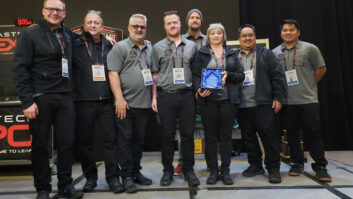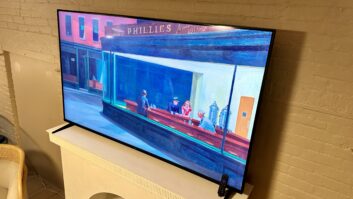MINNEAPOLIS – In a show of confidence in Best Buy president/CEO Hubert Joly, investors endorsed his $20 million compensation package at the company’s annual shareholder meeting last month, and also voted to return former senior executives Brad Anderson and Al Lenzmeier to the boardroom.
Anderson, the company’s onetime CEO and vice chairman, and Lenzmeier, a past president/COO and co-vice chairman, had reclaimed their director seats in April as part of a reconciliation with founder, majority shareholder and wouldbe acquirer Dick Schulze. The two had teamed with Schulze to develop a turnaround plan as part of his buyout bid, and will serve as is eyes, ears and de facto voice on the board following his ouster as chairman last year.
Their seats were up for election at the annual shareholders meeting, held at Best Buy headquarters here, where investors also endorsed Joly’s multimilliondollar pay package. Despite past criticism of the management compensation, which some argued was disproportionate to the company’s performance, the board said Joly’s terms also reflect the payout he forfeited by leaving Carlson in August.
Since then Joly has assembled a new management team and devised and initiated a turnaround plan while contending with Schulze’s takeover attempts. Addressing shareholders at his first Best Buy annual meeting – which Schulze also attended in his new honorary role as chairman emeritus – Joly said the company has accomplished a great deal in the seven months since he outlined his Renew Blue revitalization strategy, which calls for $725 million in cost reductions, streamlining the supply chain, remerchandising the sales floor and overhauling ecommerce.
One new initiative that addresses several of those issues is a 50-store pilot project in which online orders are fulfilled by local Best Buy stores when dot-com inventory is unavailable. Between 2 percent and 4 percent of online sales are lost due to out-of-stocks, Joly noted, even though the item may be available in 80 percent of stores, and the stock-outs contribute to Best Buy’s comparatively low online conversion rate of 1 percent.
During the meeting, he also responded to an investor’s question about future store closures by noting that “Our goal in life is not to close stores. Our goal in life is to be cost competitive and to grow the business.” To that end, seven unproductive locations have been closed during his watch, leases have been renegotiated, and store performance is being monitored as other leases near expiration.
In response to another investor who asked how Best Buy intends to be price competitive, Joly answered “Our strategy to be price competitive is to be price competitive. The name is on the building. We have to be the best buy.”
He added that while the company is still in the early stages of its turnaround, and has lots of work ahead, “I’m more excited today about our strengths and opportunities than I was seven months ago.”
In other Best Buy news, the retailer has completed the sale of its 50 percent interest in Best Buy Europe to its British partner Carphone Warehouse (CPW). CPW, which also helped Best Buy revamp its now successful mobile business in the U.S., paid $570 million in cash, $123 million in CPW shares, and will pay $39 million in cash and 2.5 percent interest annually for the next two years for Best Buy’s share of the European operation.
In turn, Best Buy paid CPW about $43 million to terminate its interest in Best Buy’s mobile businesses in Mexico and China, and to satisfy any other outstanding obligations.
Analysts have lauded Joly for extricating the company from the costly and largely failed expansion attempt in Europe. Joly is also expected to pare back Best Buy’s other offshore ventures, particularly in China, in order to focus on strengthening the core U.S. business.












